
The Volkstheater Millowitsch, also known as the Millowitsch-Theater, was a medium-sized theatre in Cologne, Germany where popular, low-brow comedies were performed. [1]

The Volkstheater Millowitsch, also known as the Millowitsch-Theater, was a medium-sized theatre in Cologne, Germany where popular, low-brow comedies were performed. [1]
The Millowitsch family had been active in theatre before ownership of this building with a tradition dating back to 1792. With the onset of the Great Depression and the ensuing inflation, Peter Millowitsch was forced to abandon the family’s old theatre and tour Cologne and the surrounding area, until in 1936 they finally moved into the new theatre in Aachener Straße.
In 1940 Willy Millowitsch took charge of the theatre. During World War II it was damaged, but not too severely, so on September 16, 1945, the theatre was reopened. In the time from 1945–1949 there were daily performances in the theatre, but afterwards the attendance dropped and Millowitsch had to rent out the theatre sometimes. Fortunately, the building doubled as a cinema, so he could still make money with it.
The first live broadcast of a theatrical performance in front of a real audience on German television took place in this theatre. On October 27, 1953 Willy Millowitsch’s Kölsch dialect play Der Etappenhas was broadcast on the Western regional channel WDR. It was immensely successful and just six weeks later was broadcast again, live, from the Millowitsch-Theater. Over the course of the years, over one hundred performances from the Volkstheater Millowitsch were shown on television.
The television plays spawned interest in theatre and the audiences gradually grew and by the 1960s a steady flow of people were teeming in to see Millowitsch’s plays firsthand. He renovated the building in 1967 and the Volkstheater once again became a focal point of local culture. Changing his original concept, Millowitsch turned the theatre from a house just for plays into a venue for local performances of all kinds. Many young dialect artists started their careers there, including the now famous singing groups Bläck Fööss and Höhner.
In 1998 only few months before Willy Millowitsch’s death in 1999, his son Peter Millowitsch took over the running of the establishment.
The Millowitsch-Theater is located at Aachener Straße 5, near the Hahnentor and Rudolfplatz in the centre of Cologne, just by the tramline. It is a medium-sized theatre that can seat up to 383 people. Ticket prices usually range from €19 – €24.
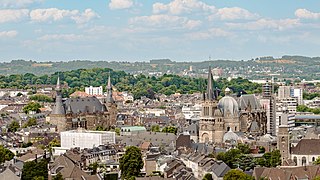
Aachen is the 13th-largest city in North Rhine-Westphalia and the 27th-largest city of Germany, with around 261,000 inhabitants.
Colognian or Kölsch is a small set of very closely related dialects, or variants, of the Ripuarian group of dialects of the Central German group. These dialects are spoken in the area covered by the Archdiocese and former Electorate of Cologne reaching from Neuss in the north to just south of Bonn, west to Düren and east to Olpe in northwest Germany.

Willy Millowitsch was a German stage and TV actor and the director of the Volkstheater Millowitsch in Cologne.

The Cologne Ring is a semi-circular, some 6 km long urban boulevard in Innenstadt, Cologne and the city's busiest and most prominent street system. The Cologne Ring is a four lane street and part of Bundesstraße 9.

Münchner Volkstheater, or Munich People’s Theater, is a company based in the Bavarian capital and operated by the cultural office of the city government. Its original performing home opened in 1903. This was rebuilt in 1955, in 1983 and finally in 2021. It now can hold over 800 spectators. Since 2002, Christian Stückl has served as the company’s Intendant.

Rudolfplatz station is an interchange station and hub on the Cologne Stadtbahn lines 1, 7, 12 and 15 in the Cologne district of Innenstadt. The station is located at Rudolfplatz, a major junction between the Cologne Ring and Aachener Straße. It opened in 1987 and is divided into an overground part for lines 1 and 7 and an underground part for lines 12 and 15.

Hänneschen-Theater is a traditional puppetry-theatre in Cologne, Germany. It was established in the year 1802. The stage is situated in a building on Eisenmarkt in downtown Cologne. The pieces are set in Knollendorf, a fictional village somewhere in the outskirts of Cologne. The popular puppets represent fictional characters who embody typical traits of cologne people, so Tünnes and Schäl, Hänneschen and Bärbelchen, as well as other unique characters. In addition to the ever-changing pieces that are staged for adults and children, the puppet shows are also an important part of the Cologne Carnival. The carnival puppet session is each year a loving parody of a conventional Carnival session.

Melaten is the central cemetery of Cologne, North Rhine-Westphalia, which was first mentioned in 1243. It was developed to a large park, holding the graves of notable residents.
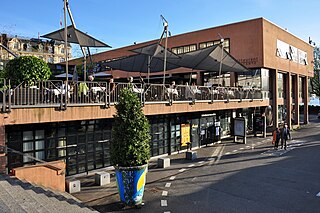
The Bernhard-Theater Zürich or Bernhard Theater is a theatre in German-speaking Switzerland situated at Sechseläutenplatz in Zürich. It is part of the building complex Opernhaus Zürich and also houses the Restaurant Belcanto. The theater was founded by and named after Rudolf Bernhard in 1941.

Margrit Rainer born as Margrit Rosa Sandmeier was a Swiss comedian, radio personality, and stage and film actress starring usually in Swiss German language cinema and television and stage productions.
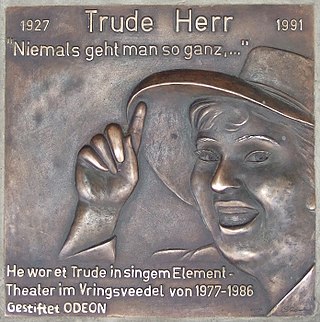
Trude Herr was a German film actress, singer and theatre owner. She was an entertainer in Germany from the early 1960s until her retirement.
Peter Becker is an Anglo-German actor. He was born in 1979 in Bad Hersfeld to a German father and a British mother and was raised between Germany and the UK. Becker had his first role as a theatre actor at 15 years old at the renowned Bad Hersfelder Festspiele.
The Nestroy Theatre Prize is an Austrian theatre award named after the poet Johann Nestroy. In 2000, the city of Vienna decided to combine two less noticed theatre awards: the Kainz Medal and the Nestroy Ring for Viennese Satire. The prize honours outstanding achievements at the Viennese and other Austrian theatres. The prize has been awarded annually in eight up to fourteen categories. Its ceremony is held in Vienna and broadcast live on national television.
Lucy Millowitsch was a German stage-actress, screen star, stage director/producer, theatre co-owner/manager and dramatist.

Marie-Luise Millowitsch is a German actress.

The Volkstheater Frankfurt – Liesel Christ was founded in 1971 in Frankfurt by Liesel Christ. In addition to dialectal plays in Frankfurterisch and classical entertainment plays, it also performed adaptations of classical dramas, contemporary plays and rediscoveries of older stage literature.
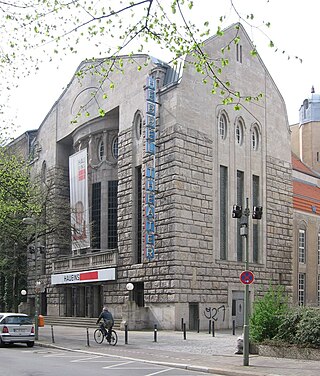
The Hebbel-Theater is a historic theatre building for plays in Berlin-Kreuzberg, Germany. It has been a venue of the company Hebbel am Ufer (HAU) from 2003.
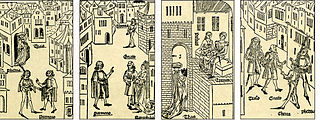
The history of the theatre in Cologne, Germany, has its roots in the Middle Ages. Although there are references to the existence of a Late antiquity Cologne theatre in the Roman Colonia Claudia Ara Agrippinensium, as has also been proven for other Roman cities. Despite this culture of theatrical play cultivated in the Roman past, a direct link to this time and form does not take place until centuries later. Although Cologne was one of the most important cities in Europe in the Middle Ages, the city had no significance in the theatre sector. The indecisiveness of the mayors over the centuries marked Cologne as an exception among major German cities in the field of theatre. After the revival of this art, theatre in Cologne also underwent a change to modern history.

The Hans Otto Theatre, named after the actor Hans Otto, is a municipal theatre in Potsdam in Germany. Its headquarters and main venue is in the Großes Haus am Tiefen See in Potsdam's cultural district on Schiffbauergasse. Other regular venues are the neighbouring historic Reithalle and occasionally the Palace Theatre in the Neues Palais.

Heide Keller was a German actor and screenwriter. She became known to a wide audience primarily through her portrayal of the head hostess Beatrice von Ledebur in around 80 episodes in the ZDF series Das Traumschiff and in 27 episodes of the spin-off Cruise into Happiness.